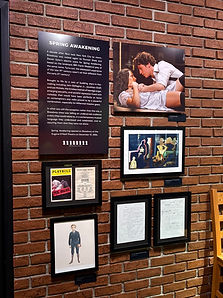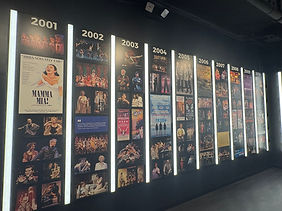top of page


The Rise of Jukebox Musicals and Blockbusters
The 2000s


The 2000s began with uncertainty following the contested 2000 presidential election and the September 11th terrorist attacks in 2001. The years that followed included the War on Terror and economic challenges, especially the Great Recession in 2008. Meanwhile, pop culture exploded with the rise of reality TV, the dominance of iPods and MP3s, and the popularity of franchises like Harry Potter. Social media platforms like Facebook and YouTube began shifting the way in which people consumed media.
Similarly, Broadway was yet again transformed in the 2000s, and saw an increase in the commercially driven shows of the 80s and 90s that appealed to a broader, tourist-oriented audience. This was mostly accelerated by the aftermath of 9/11 and its effect on tourism and Broadway attendance, which had dropped by nearly 80% (Simon, 2019).
“With tourists making up more than 60 percent of its audience, Broadway had resigned itself to being little more than a tourist trap -- like the soul-less floor shows of Las Vegas, but with occasional sparks of invention” (Kenrick, 2005-2009).
Though theaters reopened just two days after the tragedy, the financial impact was severe. In response, producers focused on commercial hits that could guarantee consistency in attendance and income. This approach often sacrificed creativity in favor of box office draws, favoring familiarity over innovation.
One of the key strategies used to attract audiences in the 2000s was the jukebox musical, a musical in which the majority of songs are pre-existing and well-known. The other strategy was to develop shows rooted in familiar popular culture. These productions helped to bring back reluctant theatergoers and attracted new ones through nostalgia and musical comfort.
“These shows (could) easily draw a generation that grew up listening to this music, and their children may have done so too” (Findlay, 2022).
However, while much of Broadway in the 2000s leaned into artistic safety, the decade was not entirely devoid of innovation. As the years progressed, some productions began to push boundaries again and create the next era of Broadway.





One of the most successful Broadway musicals of the 2000s, Wicked used its innovative and poignant storytelling to reimagine a classic narrative. Wicked acted as a prequel to The Wizard of Oz story through the lens of Elphaba, “The Wicked Witch of the West,” exploring her past, her misunderstood identity, and the society that drove her to become “wicked.” This twist, the show’s powerful score, and its relevant themes gave audiences a new way to engage with a classic story.
“The action of the 1939 film is never seen, but at times we are seconds away from it, and the context is revealed anew. The result is a story at times funny, horrifying, and always fascinating, with subtleties in the Billy Budd–like question of good and evil that are rare for a musical” (Findlay, 2022).
By challenging the ideas of morality and villains, Wicked invited viewers to consider how society constructs identity and makes preconceived notions of others. This depth was rare for a mainstream musical, and allowed audiences to not only be entertained, but also moved by the story’s relevance to real-world issues like discrimination and power.
Beyond its story, Wicked gained a strong fan base through its score, dynamic characters, and empowering messages, especially for women and outsiders. Songs like “Defying Gravity” and “For Good” became classics that resonated far beyond the theater.
“The story is captivating, with characters that everyone can relate to. The music is memorable and catchy, carrying a strong message about tolerance and acceptance….(The song’s) appeal to universal concerns have taken off outside the boundaries of Wicked, to become anthems of the underdog, and empowering women the world over” (Gershwin Theatre, n.d.).
The show’s feminist themes, exploration of identity, and celebration of personal strength have helped Wicked to sustain relevance for decades. Its influence continues today as renewed interest in the still running production on Broadway was sparked by the two-part movie adaptation starring Ariana Grande and Cynthia Erivo.





While the 2000s saw the rise of many blockbuster Broadway hits, Taboo stands out as one of the decade’s most notable failures. Directed by Christopher Renshaw, Taboo was a musical centered around London’s club scene in the early 1980s. It revolved around two rising icons: Leigh Bowery, a performance artist and fashion designer, and George O’Dowd who would become the pop sensation Boy George.
Set in the real-life nightclub “Taboo,” the show aimed to capture the glamour, chaos, and culture of the era, but it struggled to find a clear dramatic focus. It was “...well meaning if it's nothing else; underneath its shabby period glitz (was) a heart just longing to be revealed. But that well-intentioned heart (was) lost somewhere underneath the messy show Taboo (had) become, as the show's creators (had) never satisfactorily determined what the show is or needs to be” (Murray, 2003).
The show had emotional potential and meaningful themes, but its execution left audiences bewildered. Without a clear sense of tone or direction, Taboo struggled to balance visuals with storytelling. Instead of delivering a moving narrative about queer identity and artistic freedom, its delivery was scattered.
The chaos was not just limited to the plot, the production was also plagued by behind-the-scenes drama. Rosie O’Donnell personally funded the Broadway run, but clashes with creatives led to rewrites and cast changes. Even with catchy music and the star power of Boy George, the lack of a creative vision hurt the show from within.
“But there are no “villains” in this story, really – just a volatile, distracted and ultimately ineffectual producer; a weak director; a timid book writer who watched his key scenes get cut because they couldn’t be acted or directed properly; and a star, Boy George, who wrote a fine score (let’s give him his due) but wasn’t much of an actor” (Riedel, 2004).
The show’s failure was not just about content, but also about a team that could not bring that content to life. With so many competing visions and limited theatrical experience, even Boy George’s catchy score could not save Taboo.


bottom of page